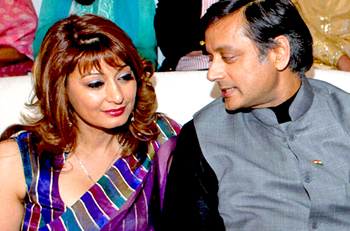New Delhi, Jan 16: Delhi Police's Special Investigation Team (SIT), probing the death of Sunanda Pushkar, on Thursday questioned the crew of a flight from Thiruvananthapuram to Delhi in which former Union minister Shashi Tharoor and his wife had allegedly fought on January 15, 2014.
The SIT may also question a senior Congress leader, who was on the same flight, about what was the fight all about and what triggered it, said a police official associated with the probe. "The members of the flight's crew were also questioned on these lines," the official said.
During his questioning, Tharoor's domestic help Narayan Singh had told police that after landing at Delhi, Pushkar had called their family friend Sunil Trakru who had taken her to the five star hotel where she was found dead later. Earlier in the day, Delhi Police Commissioner BS Bassi on Thursday said that the SIT probe is on at full swing.
Some of those questioned in the case so far include Narayan Singh, Tharoor's family friend Sanjay Dewan, the hotel doctor who pronounced her dead, hotel's staff including its manager.
The official also said that police will question in a day or two a woman journalist with whom Sunanda had spoken before her death and Tharoor's PS Abhinav Kumar who had informed the then SHO of Sarojini Nagar police station about the death.







Comments
Add new comment